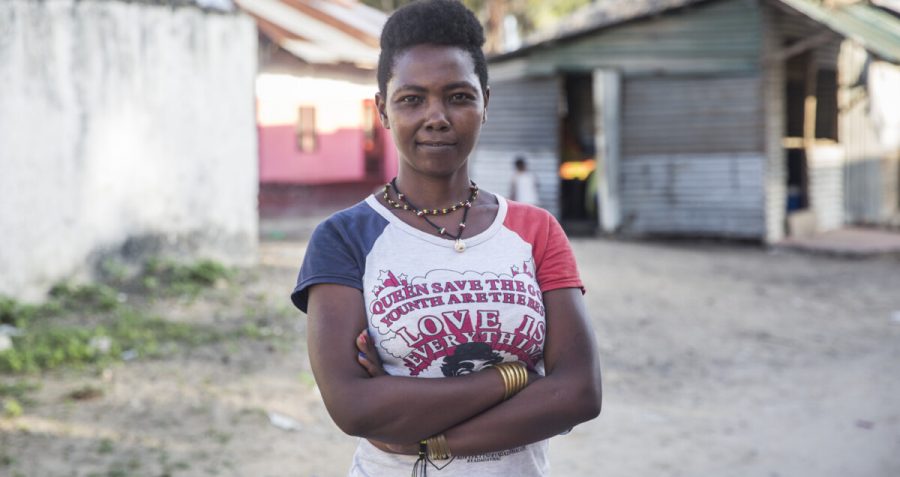LVCT Health’s one2one digital platform

Key information
- Organisation: LVCT Health
- Country: Kenya
- Region: Eastern and Southern Africa
- Stage of innovation: Stage 6: In the market and ready to scale
- Dates: 2006 – ongoing
- Type of innovation: New combination of existing services
Summary of intervention
High-quality health care is often constrained by access barriers and inadequate resources, impacting service delivery, patient follow-ups, and exacerbating health issues. Digital health innovations are fast emerging as essential tools to respond to these challenges globally, with an increasing shift from facility-based health delivery to mobile health services.
LVCT’s one2one digital platform, with its innovative stepped-care model, is providing tailored services and personalised care for young people in low-resource settings in Kenya, bridging the gap between health care workers and young people. Firstly, one2onekenya provides knowledge on critical health topics such as HIV, sexual and reproductive health and rights (SRHR), gender-based violence (GBV) and mental health, with a reach of over 650,000 users. The second step uses digital tools, e.g. the one2one chatbot and Here2Help GBV Chatbot, enabling tailored advice and referrals; 8,000 users having received information. Users access closed WhatsApp groups managed by over 200 peer educators, fostering a sense of community and providing psychological support. Offline interventions also play a significant role, where peer educators engage in support groups in the community.
The one2one youth hotline has provided professional counselling services to over 200,000 users, employing communication channels such as calls, SMS, WhatsApp, and Facebook Messenger.
Finally, face-to-face counselling and health care services in youth-friendly facilities complete the continuum of care, including referrals for specialised treatments, ensuring comprehensive support for those with more complex needs.
Promising results include increased user engagement, positive feedback, and enhanced knowledge about HIV, GBV, SRHR, and mental health. Users actively participate in interactive tools, fostering a thriving community and showcasing positive behavioural changes indicative of more informed decision-making.
learnings
Developing the stepped care model presented challenges. Integrating the diverse components of online and offline interventions into a cohesive system required extensive coordination and strategic planning. Allocating resources effectively across the various steps of the model needed careful consideration of where investments would yield the most impact.
Ensuring universal accessibility and usability of digital tools posed difficulties, particularly in remote or underserved areas with limited digital literacy. Adapting interventions to diverse cultural contexts was essential but demanded attention to cultural nuances and preferences to ensure acceptability and efficacy among the target populations.
Establishing an effective monitoring and evaluation system proved crucial to assessing the impact of the overall model and each step. Developing suitable metrics and methodologies for tracking progress, measuring outcomes, and facilitating data-driven improvements presented continual challenges. Addressing these obstacles required a holistic approach, emphasising collaboration, adaptability, continuous learning and refinement to ensure the effectiveness and sustainability of the stepped care model within the broader systems framework.
It was vital for LVCT to recognise the diversity of its audience — their age, culture, gender, and economic situation — and to constantly engage with them and integrate their feedback. Balancing tailored approaches and a unified user experience to accommodate individual needs while maintaining a seamless platform was essential.
A robust technological infrastructure, user-centric design methodologies, and stringent data privacy measures formed the backbone of the platform’s functionality and user trust. Engaging stakeholders, including government bodies like the Ministry of Health and Education, ensured alignment with broader health goals and priorities.
next steps
LVCT is conducting a longitudinal impact evaluation, which will provide valuable insights into long-term behavioural changes and health outcomes. Scaling the innovation to other countries in Africa and forging partnerships with diverse organisations are integral. Enhancing technological integration by incorporating developments such as AI-driven personalisation will improve user experiences and extend service offerings. LVCT will strengthen community engagement strategies and use data for advocacy efforts at national and African levels.
Securing increased funding and resources will drive ongoing innovation, research, and expansion plans. Establishing strategic partnerships with global health organisations, tech companies, and local stakeholders will provide expertise and resources for scaling the innovation.
sustainability
LVCT will strengthen community engagement strategies and use data for advocacy efforts at national and African levels. Securing increased funding and resources will drive ongoing innovation, research, and expansion plans. Establishing strategic partnerships with global health organizations, tech companies, and local stakeholders will provide expertise and resources for scaling the innovation.
Find out more about one2one HERE.

